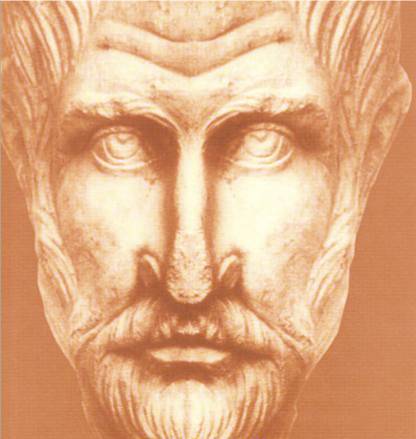

















![]()
In Proclus we have the culminating point of the Neo-Platonic philosophy; this method in philosophy is carried into later times, continuing even through the whole of the Middle Ages. Proclus had several successors who were scholarchs at Athens — Marinus, his biographer, and then Isidorus of Gaza, and finally Damascius. Of the latter we still possess some very interesting writings; he was the last teacher of the Neo-Platonic philosophy in the Academy. For in 529 A.D. the Emperor Justinian caused this school to be closed, and drove all heathen philosophers from his kingdom: amongst these was Simplicius, a celebrated commentator on Aristotle, several of whose commentaries are not yet printed. They sought and found protection and freedom in Persia under Chosroes. After some time they ventured to return to the Roman Empire, but they could no longer form any school at Athens; thus as far as its external existence is concerned, the heathen philosophy went utterly to ruin. Eunapius treats of this last period, and Cousin has dealt with it in a short treatise. Although the Neo-Platonic school ceased to exist outwardly, ideas of the Neo-Platonists, and specially the philosophy of Proclus, were long maintained and preserved in the Church; and later on we shall on several occasions refer to it. In the earlier, purer, mystical scholastics we find the same ideas as are seen in Proclus, and until comparatively recent times, when in the Catholic Church God is spoken of in a profound and mystical way, the ideas expressed are Neo-Platonic.
Georg Wilhelm Friedrich Hegel, Lectures on the History of Philosophy, Translation by Elizabeth S. Haldane and Frances H. Simson, English edition published in 1896.
![]()
The culmination of all this confusion we see in Proclus. The unfortunate Hypatia, who is the most important personage between him and Iamblichus, has left no writings to our times; we can only judge of her doctrine by that of her instructors and her pupils. Proclus was taught by the men who had heard her lecture; and the golden chain of the Platonic succession descended from her to him. His throne, however, was at Athens, not at Alexandria. After the murder of the maiden philosopher, Neoplatonism prudently retired to Greece. But Proclus is so essentially the child of the Alexandrian school that we cannot pass him over. Indeed, according to M. Cousin, as I am credibly informed, he is the Greek philosopher; the flower and crown of all its schools; in whom, says the learned Frenchman, "are combined, and from whom shine forth, in no irregular or uncertain rays, Orpheus, Pythagoras, Plato, Aristotle, Zeno, Plotinus, Porphyry, and Iamblichus;" and who "had so comprehended all religions in his mind, and paid them such equal reverence, that he was, as it were, the priest of the whole universe!"
Charles Kingsley (1819-1875), Alexandria and Her Schools
![]()